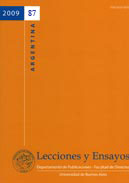El recurso: de mecanismo de control a garantía.
Keywords:
appeals against criminal courts' decisions, criminal trial system, control mechanism, power, rights' safeguardAbstract
In this work, we will discuss how the appeal, deemed so far to be a control mechanism, adopted a rights-safeguard approach. Further, the history of the trial system as background for the creation of the appeal, the main phylosophical and political ideas in each period, and the various meanings of appeal will be examined. In order to undergo a non-conventional analysis, thus avoiding affimations of an evolutional type as regards the change in the idea or concept, we will use terms coined by FOUCAULT. Emphasis will not be laid on the legal aspect of power, construed as repression, but on its positive aspect, concerning the knowledge developed through it, including legal tools, such as appeals. In this essay, the subsistence of an appeals mechanism is considered to be grounded on the fact that such practice, beyond discourse changes introduced in order to justify it, was useful to achieve certain goals during emergency periods. Certain aspects of this tool allowed a rights-safeguard approach, aimed at remediating arbitrary or unlawful adverse court decisions affecting the accused or condemned.
Downloads
Downloads
Published
How to Cite
Issue
Section
License

This work is licensed under a Creative Commons Attribution-NonCommercial 4.0 International License.











